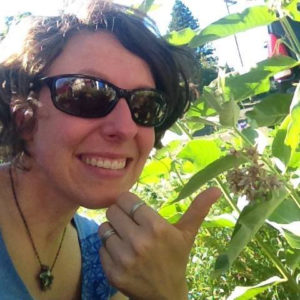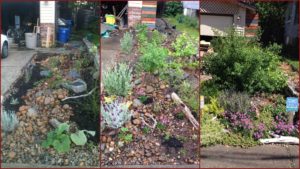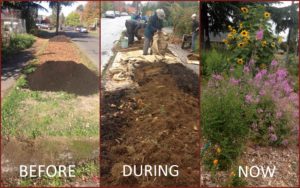141: Sherrie Pelsma on Pollinator Parkways
Bolstering pollinators in urban spaces and expanding safe habitats.
– – – –
 Sherrie grew up on the rural Oregon Coast before moving to Portland to finish her degree. She has spent the last 10 years in Community Education, and runs a program where participants learn Do-It-Yourself skills to make homes safer and more energy efficient. As an environmentalist who loves macro photography, she took a special interest in pollinators and other insects which quickly blossomed into the love that drove the founding of the project Pollinator Parkways.
Sherrie grew up on the rural Oregon Coast before moving to Portland to finish her degree. She has spent the last 10 years in Community Education, and runs a program where participants learn Do-It-Yourself skills to make homes safer and more energy efficient. As an environmentalist who loves macro photography, she took a special interest in pollinators and other insects which quickly blossomed into the love that drove the founding of the project Pollinator Parkways.
Pollinator Parkways is new project designed to help renovate urban space into habitats that provide resources for our bees, butterflies, and other important insects upon which so much of our flora and food systems are reliant.
In This Podcast:
Sherrie shares her passion for the bees, butterflies, hummingbirds and other animals that serve such a vital purpose in the life-cycles of plants including the food we rely on every day. Greg gets a chance to talk to her about how a simple interest grew into a passion and how she has turned that into a project that is truly making a difference in her community. Sherrie is inspiring as she explains what she is doing to extend habitats and at the same time educating community members about pollinators.
Listen in to Learn About:
- How she learned about the loss of pollinator ecosystems
- The day she realized she could make a difference
- What a parking strip or parkway is in an urban space
- What a pollinator is and what it does – any animal (or insect) that transfers pollen from one location to another
- How her hobby of photography helped her connect with pollinators
- How many plants rely on pollinators
- What a keystone species is and why this term is almost outdated
- Rapid declines in some known pollinator species
- Some of the reasons behind the declines
- What habitat fragmentation is and why safe spaces are important
- How the new habitats are becoming popular
- What has happened in the program in the past few years
 A rain garden: Over two years time
A rain garden: Over two years time
- Some of the organizations that she has worked with or learned from
- How important native plants are for local pollinators
- How can each plant in a space support the most pollinators
- The difference between integrated pest management and chemicals
- Why early blooming plants are important to the life cycle of the pollinators
- How blooming plants are critical at the end of the season before the cold season sets in

A grass parkway transformed
- Why other non-food plants like flowers are important in gardens
- Why a honey bee cannot pollinate a tomato and a native bumble bee can
- How she is gathering supporters in her area
- How to find a 10-page manual to convert a parking strip to a habitat for these animals
- How to find out which plants are good for your area through different resources
- Xerces Society, an invertebrate protection group
- How to be a citizen scientist and why it is necessary
- How she negotiated her way through the bureaucracy for conversions in Portland
As well as:
- What happened on her first project that helped her learn that ‘cramscapping’ is better in the long run than going skimpy and how she learned that $500 does not go that far in her plants, also how to trust in her research
- That her early participants are really taking an ownership and caring about the projects
- How her concern for nature and doing something to fix a problem is what is driving her to continue her work
- Her advice: Go get a flowering native plant to help encourage wildlife in your garden.
Sherrie’s Recommended Books:
Bringing Nature Home by Douglas Tallamy
Attracting Native Pollinators by Xerces Society
How to reach Sherrie:
Facebook: Pollinator parkways
*Disclosure:
Some of the links in our podcast show notes and blog posts are affiliate links and if you go through them to make a purchase, we will earn a nominal commission at no cost to you. We offer links to items recommended by our podcast guests and guest writers as a service to our audience and these items are not selected because of the commission we receive from your purchases. We know the decision is yours, and whether you decide to buy something is completely up to you.








What a good podcast – had never thought of doing this. Thx so much for introducing her to us
Wonderful and informative interview. So much information and concepts to think about. Made my morning walk go by so fast. Thank you!